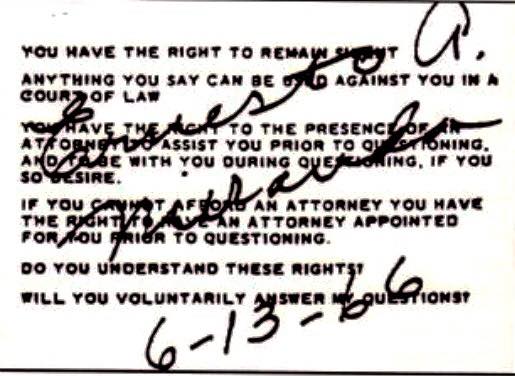 Monday, June 13th 2016 marks the 50th anniversary of the landmark United States Supreme Court Decision Miranda v. Arizona.
Monday, June 13th 2016 marks the 50th anniversary of the landmark United States Supreme Court Decision Miranda v. Arizona.
On March 13, 1963, Ernesto Miranda was arrested, in Phoenix for multiple felonies based on circumstantial evidence. Officers took him into custody and after two hours of interrogation, Miranda signed a confession to the offenses.
Miranda was not able to speak to a lawyer before or during any of the police interrogation and he was never even made aware that he had the right to have an attorney present. He was convicted at trial based on his signed confession and his appeal to the Arizona Supreme Court was affirmed.
The United States Supreme Court reversed the convictions and issued one of the most important opinions in the history of our criminal justice system to date. Miranda insures every person the right to counsel during interrogations by police. Chief Justice Earl Warren wrote the opinion in Miranda v. Arizona. The decision was in favor of Miranda. It stated that:
The person in custody must, prior to interrogation, be clearly informed that he has the right to remain silent, and that anything he says will be used against him in court; he must be clearly informed that he has the right to consult with a lawyer and to have the lawyer with him during interrogation, and that, if he is indigent, a lawyer will be appointed to represent him.
The opinion was released on June 13, 1966. Because of the ruling, police departments around the country started to issue Miranda warning cards to their officers to recite. They read:
You have the right to remain silent. If you give up the right to remain silent, anything you say can and will be used against you in a court of law. You have the right to an attorney and to have an attorney present during questioning. If you cannot afford an attorney, one will be provided to you at no cost. During any questioning, you may decide at any time to exercise these rights, not answer any questions or make any statements. Do you understand these rights as I have read them to you?
 Miranda was retried and ultimately convicted based on other witness statements concerning his guilt. After Miranda was released from prison in 1972 he made a modest living autographing Miranda warning cards used by police officers.
Miranda was retried and ultimately convicted based on other witness statements concerning his guilt. After Miranda was released from prison in 1972 he made a modest living autographing Miranda warning cards used by police officers.
We have Ernesto Miranda to thank today for our right to have the advice of an attorney prior to answering ANY questions by police officers. Its a valuable right and one that people should exercise more often when being investigated by law enforcement.
Leave a Reply